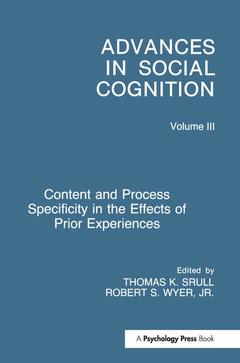Description
Content and Process Specificity in the Effects of Prior Experiences
Advances in Social Cognition, Volume III
Advances in Social Cognition Series
Coordinators: Wyer, Jr. Robert S., Srull Thomas K.
Language: English
Subject for Content and Process Specificity in the Effects of Prior...:
Keywords
social; cognition; exemplar; information; category; accessibility; test; word; fragment; completion; Word Fragment Completion; Category Accessibility Test; Word Fragment Completion Test; Group Level Information; Category Accessibility; Trait Judgments; Exemplar Information; Abstractionist Models; Anderson’s Act; Specific Prior Experiences; Word Fragment Completion Task; Category Level Information; Exemplar Representations; Implicit Memory Tests; Abstract Knowledge Structures; Trait Word; Social Cognition; Trait Relevant Behaviors; Exemplar Memories; Autobiographical Task; Behavioral Exemplars; Self-descriptiveness Judgments; Episodic View; Alphabet Arithmetic; Target Article
· 15.2x22.9 cm · Paperback
Description
/li>Contents
/li>Readership
/li>Biography
/li>
In Volume 3, Eliot R. Smith of Purdue University proposes that social cognition theorists have placed excessive emphasis on the role of schemata, prototypes, and various other types of abstractions. This has affected both the methodologies they use and the type of theories they construct. What has not been adequately appreciated is the storage and retrieval of specific episodes, especially those with idiosyncratic features. This volume s designed as a required text for those studying personality, experimental and consumer psychology, cognitive science, and communications.
Contents: E.R. Smith, Content and Process Specificity in the Effects of Prior Experiences. L.W. Barsalou, On the Indistinguishability of Exemplar Memory and Abstraction in Category Representation. J.N. Bassili, Cognitive Signatures and Their Forgery. D.L. Hamilton, D.M. Mackie, Specificity and Generality in the Nature and Use of Stereotypes. L.J. Jacoby, M.J. Marriott, J.G. Collins, The Specifics of Memory and Cognition. C.M. Judd, Specific Encoding Yet Abstract Retrieval of Social Categories. S.B. Klein, J. Loftus, The Role of Abstract and Exemplar-Based Knowledge in Self-Judgments: Implications for a Cognitive Model of the Self. G.D. Logan, Social Cognition Gets Specific. T.M. Ostrom, The Maturing of Social Cognition. T.K. Srull, R.S. Wyer, Jr., Content and Process Specificity: Where Do We Go from Here? E.R. Smith, Reply to Commentaries.
These books may interest you

Unified Social Cognition 16.41 €



